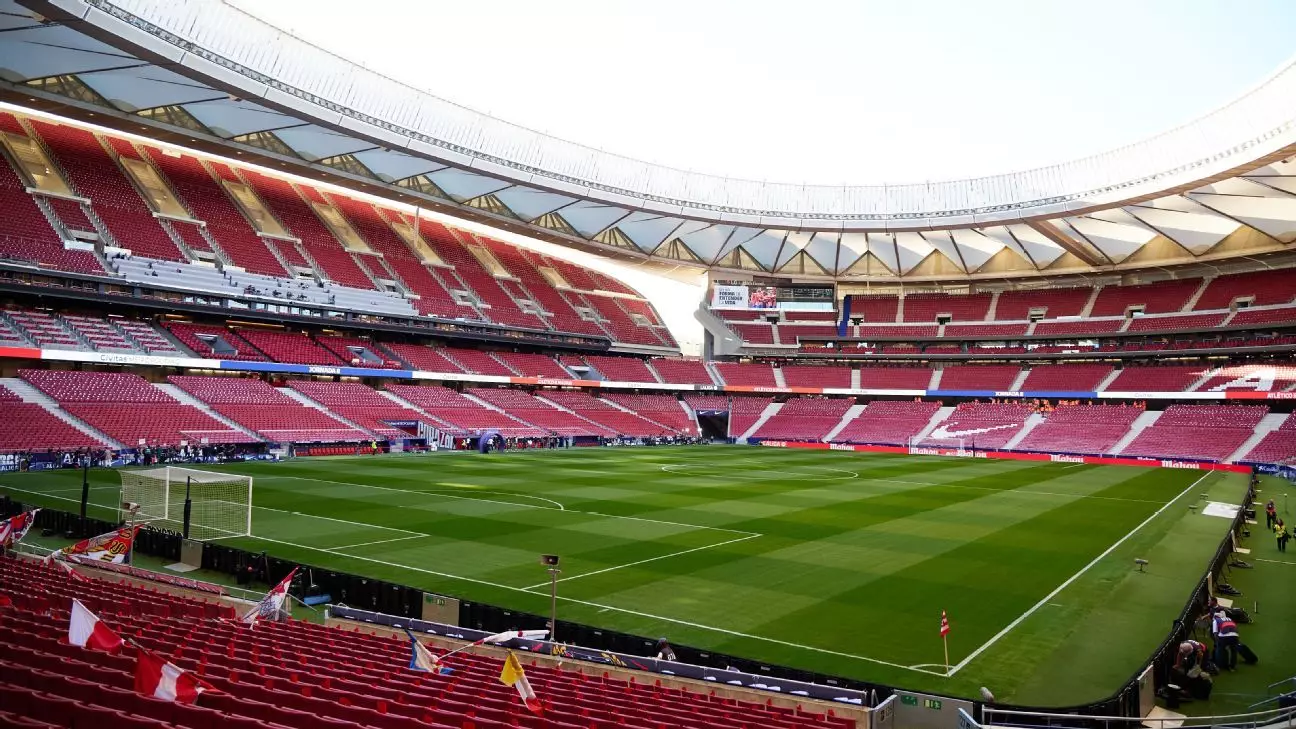In a noteworthy development within the realm of international sports marketing, Saudi Arabia has solidified its branding strategy by acquiring the naming rights to Atlético Madrid’s stadium for the next nine years. This decision marks a significant milestone not only for the Spanish football club but also for the broader ambitions of Saudi Arabia as it seeks to enhance its global footprint through sports. The stadium will now be referred to as the Riyadh Air Metropolitano, with this agreement solidifying the already successful sponsorship relationship between Atlético and the state-owned airline, Riyadh Air, which has been promoting itself on the club’s jerseys since the previous season.
The Metropolitano stadium has undergone several transformations in terms of branding since its inauguration in 2017. Originally named the Wanda Metropolitano via a partnership with a Chinese real estate firm, the stadium was subsequently rebranded as the Civitas Metropolitano following an agreement with a Spanish property developer in 2022. Each name change reflects a keen business strategy aimed at maximizing revenue streams through sponsorship. The current deal with Riyadh Air illustrates the importance of lucrative partnerships in today’s sports marketing landscape and showcases Saudi Arabia’s intention to invest heavily in its global presence.
The financial parameters of the current agreement have not been disclosed; however, it has been characterized as the most valuable sponsorship in Atlético’s history. The previous shirt sponsorship alone—estimated at around €40 million per season—indicates the dual approach of maximizing both on-field and off-field revenues. Such financial influxes into clubs like Atlético Madrid provide new avenues for growth, player acquisitions, and enhanced fan experiences.
The Implications of Saudi Arabia’s Vision 2030
The strategic move to sponsor Atlético Madrid is firmly tied to Saudi Arabia’s Vision 2030, an ambitious roadmap aiming to diversify the kingdom’s economy beyond oil. Hosting high-profile events, including sporting competitions, is a vital component of this vision. Anticipation swells as Saudi Arabia is the frontrunner to host the 2034 FIFA World Cup, with the decision poised to be made by FIFA member federations in December 2023. Securing this prestigious event would complement the kingdom’s endeavors to reshape its global image.
However, the ambitions of Saudi Arabia do not come without controversy. The kingdom faces scrutiny regarding its labor practices, particularly in the construction and service sectors. Complaints from international trade unions alleging human rights abuses and wage theft have raised questions about the ethical implications of such engagements. With an estimated 21,000 workers affected over the past decade, the spotlight on Saudi Arabia reveals a juxtaposition between ambition and accountability, underscoring the challenges of harmonizing economic growth with human rights considerations.
The collaboration between Atlético Madrid and Saudi Arabia’s state-owned corporations emphasizes a growing trend of financial investments in European football by states and entities seeking to improve their brand images on a global scale. Besides enhancing fan experiences and club operations, these agreements can significantly influence boardroom dynamics within football’s elite. The presence of Miguel Ángel Gil Marin, Atlético’s CEO, as a board member of the European Club Association (ECA) indicates a strategic alliance that may elevate Atlético Madrid’s negotiating position with FIFA. Such partnerships provide leverage in dictating the conditions surrounding major tournaments and can significantly impact the club’s positioning within European football.
Simultaneously, this trend raises ethical questions about the influence of money from politically controversial states in the sport. The emblematic presence of Saudi companies in European football not only cultivates commercial growth but also accentuates a potential moral compromise for clubs that forge such relationships. The intersection of sport, business, politics, and ethics calls for an ongoing dialogue about the integrity of football and the values that clubs embody.
Saudi Arabia’s aggressive branding maneuvers through Atlético Madrid signal a paradigm shift in sports sponsorship dynamics. As countries increasingly leverage sports to promote their narratives and ambitions, the implications for the global sports community are immense. The intertwining of sports, politics, and economic interests showcases the complexities that lie in contemporary sports sponsorship and the ongoing quest for visibility and viability on the world stage. Whether this relationship will enhance Atlético Madrid’s fortunes or further embroil Saudi Arabia in controversy remains to be seen, but one thing is clear: we are entering a new era of international sports sponsorship that demands careful scrutiny and consideration.
